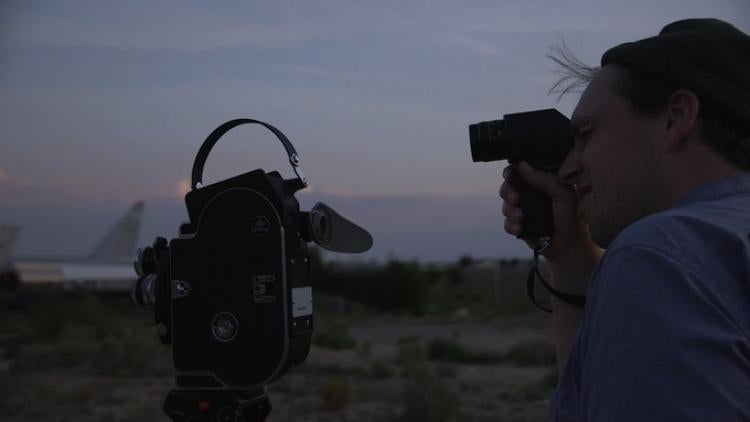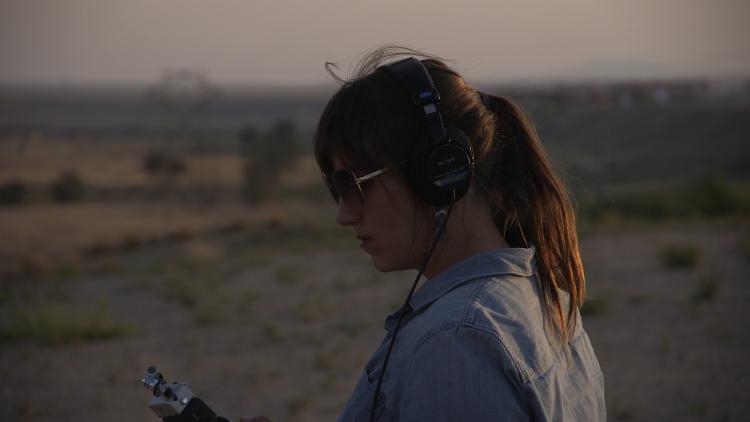Filmmaker alums tackle nuclear weapons buildup
'We want to broaden the discourse and dialogue to talk about the lingering effects,' Eric Stewart says
The nuclear weapons buildup and the protests against it were for many simply the news of the day, but for two filmmakers from the University of Colorado Boulder it may turn out to be a provocative theme for a historical documentary and multimedia oral-history archive.
“There’s the popular idea that danger from the nuclear buildup kind of stopped with the end of the Cold War,” said Eric Stewart, who received his MFA in filmmaking from CU Boulder in 2016 and now works as an assistant professor of photography at Adams State University in Alamosa, Colo. “But we want to broaden the discourse and dialogue to talk about the lingering effects.”

Eric Stewart at work in the field. Photo courtesy of Eric Stewart. At the top of the page, an image inside the protected area of the Rocky Flats Nuclear Weapons Plant in 1978. The buildings in the foreground include 984, 992, 991, 989, and 968. These buildings made up the Building 991 complex. Building 991, Plant D, was the first operational building on site, constructed in 1951 as the final assembly and shipping and receiving building. To the north and northwest of Building 991 are the underground vaults and tunnels used to store weapons components. Photo by U.S. Department of Energy, Legacy Management.
Over the past two years Stewart and fellow CU filmmaking MFA Taylor Dunne (2014) have been working to create the feature-length experimental documentary “Off Country,” a project they hope to have completed in the next two years. Dunne is a former CU Boulder and Naropa University instructor who is now an assistant professor in mass communications at Adams State, and who also happens to be Stewart’s partner in life.
Ending up in Alamosa has turned out to be a blessing for the pair—beyond the fact they are both now tenure-track professors—in that it puts them within easy reach of their locations in New Mexico, Colorado and Nevada.
“We’ve been spending a lot of time in the Trinity location (site of the first atomic bomb test) in New Mexico, so that’s really convenient,” Stewart said. The project as a whole examines Southwestern locations, including the former Rocky Flats Plant, the White Sands Missile Range and the Nevada Test Site.
Stewart said he has always been attracted to stories about working for change through civil disobedience, and the Rocky Flats protest history was the initial draw to the research. Here he has been assisted by former CU Boulder faculty member LeRoy Moore, a founder of the Rocky Mountain Peace and Justice Center.
The project examines the effects of the entire industry, from uranium mining, plutonium production and weapons building and testing, but Stewart said Flats activists here were actually a lot more successful than in other areas of the Southwest.
“Even if it wasn’t a perfect outcome at Rocky Flats, communities in central and northern New Mexico haven’t seen the same kind of results and change,” he said. Moore was instrumental in getting the pair started on the history and getting them in touch with anti-nuclear peace activists.
Dunne noted the test areas are largely populated by Hispanic families, so the film will be bilingual. That deepens the involvement for herself, Dunne said, in that they are “underrepresented histories” that the film documents.
“We are trying to tell a story through the perspective of the people's history,” she said. “This film is an extension of my previous work, where I have focused on stories about women and Indigenous people.”
While the documentary deals significantly with oral histories, Stewart said he and Dunne are still fundamentally experimental filmmakers, so the piece will not come out looking like a television documentary. “There’s been an opportunity to do this with more mainstream media, but we’re committed to make a non-traditional film,” he said.

Taylor Dunne at work in the field. Photo courtesy of Taylor Dunne.
“What I’m against is direct didactic narrative, I don’t want to tell them (the audience) what to think,” Stewart said. Instead, he said, the audience should interpret film much as they would have to any piece of art.
“This leads the viewer into a more engaged experience in the material. The viewer has to make up as much as the artist. Where do we go from here? Where does Boulder County go? How do we go on showing solidarity with communities in New Mexico and add to the accountability there?
“Working with these long landscape shots has been a challenge; we’re not going to cut in film of nuclear bombs going off,” he said. “We’re weaving these interviews with these shots of beautiful places in the West, and dichotomize these with a less than gorgeous history and less than gorgeous impacts.”
The project was initially supported by the fund named for the founder of CU’s Film Studies Program, the Virgil Grillo Memorial Award, and has also received funding from the Puffin Foundation. With perhaps two years left of filming and editing the pair is still about $7,000 short of its $10,000 goal on KickStarter funding at http://bit.ly/OffCountry.
Filmmakers Taylor Dunne and Eric Stewart are inviting Boulder County residents to participate in an effort to document the anti-nuclear/peace movement that centered on the Rocky Flats Nuclear Weapons Facility here, by joining in a discussion in Nederland from 10 a.m. to 2 p.m., Saturday, Oct. 28 at the Art House of Nederland, 171 E. 2nd Street.
Dunne noted that the work goes far beyond the feature-length documentary the pair is filming, and will include an oral history archive.
“I make research-based films, and what goes into the final piece is only the very tip of the iceberg,” she said. “It is really unsatisfying to leave out so much, so we are putting all of the complete interviews in an archive so the history will be available to anyone. Adams State University, where we work, has offered to house the archive to get it started, but we are hoping it will be expanded and (also be housed) in New Mexico or Utah.”
Their project focuses on anti-nuclear and peace activists engaged in direct action and civil disobedience. The archive will document and catalog a diverse chorus of voices whom history has neglected to be a tool for researchers, historians, and activists, to learn not only about history but the human stories of people resisting environmental contamination and political oppression.
Their work was started with a small grant from CU Boulder Film Studies and has gone on to receive support from the Puffin Foundation. They are fiscally sponsored by Basement Films, an Albuquerque-based media nonprofit, and are currently raising funds through a KickStarter campaign.

